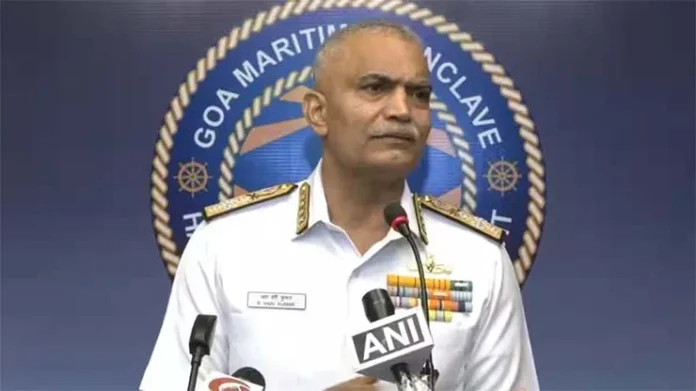New Delhi: Indian Navy Chief Admiral Hari Kumar has put forward a set of four principles aimed at fostering deeper relations among the states in the Indian Ocean Region (IOR). These proposals were presented during the Goa Maritime Conclave (GMC), a crucial platform initiated by the Indian Navy to promote collaborative maritime security efforts among IOR littoral states.
The Navy Chief expressed India’s willingness “to take lead in developing the training and capacity building pillar,” in alignment with Indian Prime Minister Narendra Modi‘s vision of ‘Security and Growth for All in the Region’ (SAGAR).
His first suggestion involves the establishment of a dynamic working mechanism that is “structure light, but functionally heavy.” Based on common maritime priorities (CMPs) this, as per Business Standard, will encompass maritime law, information, strategy and protocols, as well as training and capacity building. The second proposal emphasised the leveraging of unique capabilities and expertise brought to the table by each state.
Admiral Kumar said that “each one of us could bring to the table certain unique capabilities and expertise,” such as proficiency in maritime law, counteracting sea-borne narcotics trade, maritime surveillance, and environmental stewardship. This he said “would also lay the foundation for establishing regional Centres of Excellence (CoE)” in addition to “developing and operationalising the mitigation framework for addressing CMPs”.
Furthermore, the navy chief highlighted the importance of developing CoEs as central hubs for maritime security information within the IOR. As an example, he cited the establishment of the Information Fusion Centre for the Indian Ocean Region (IFC-IOR) in Gurugram. This initiative underlined India’s role as the primary guardian of the Indian Ocean, serving as a “net security provider” that fosters collaboration among regional countries to ensure global commons’ security, freedom of navigation, and protection against various challenges including piracy, terrorism, gun-running, narcotics, human migration, and illegal fishing.
Lastly, Admiral Kumar suggested streamlining and prioritising efforts under bilateral, mini-lateral, and multi-lateral constructs in the IOR.
The Goa Maritime Conclave witnessed the participation of ministers and navy chiefs from 12 IOR countries — Bangladesh, Comoros, Indonesia, Madagascar, Malaysia, Maldives, Mauritius, Myanmar, Seychelles, Singapore, Sri Lanka and Thailand.




